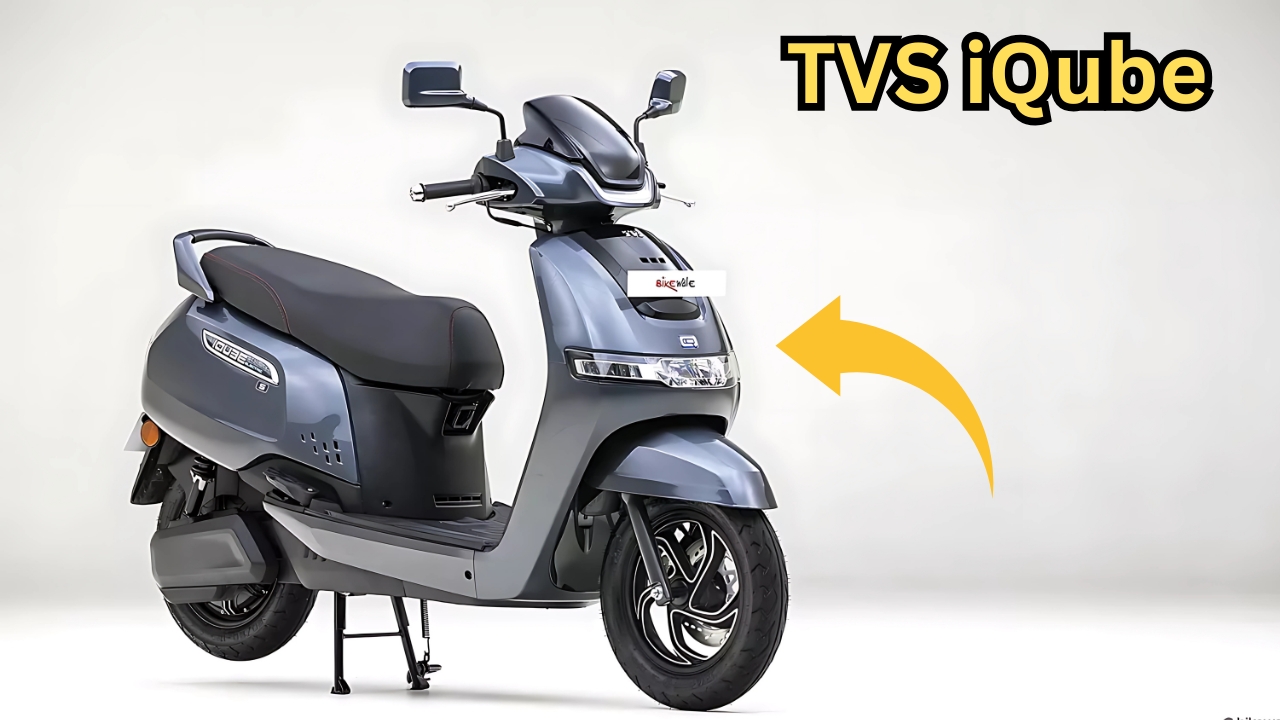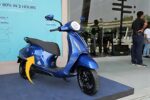TVS iQube: TVS Motor Company, a respected stalwart in India’s two-wheeler industry, made a deliberate and calculated entry into the electric vehicle segment with the iQube.
Launched initially in 2020, the scooter represented the culmination of years of research and development focused on creating a product that would meet the specific demands of Indian riders while addressing broader environmental concerns.
The development process involved extensive testing across varied Indian road conditions and climate zones, ensuring that the final product would withstand everything from monsoon downpours to scorching summer heat.
This rigorous approach reflects TVS’s commitment to delivering reliability – a crucial factor for early adopters of electric mobility solutions.
TVS iQube: Design Philosophy
The iQube’s design language speaks of thoughtful restraint rather than flamboyant futurism. While many manufacturers opt for radically distinctive styling to emphasize the “differentness” of their electric offerings, TVS chose a more balanced approach, creating a scooter that looks contemporary yet familiar.
The clean lines and uncluttered surfaces project a modern aesthetic without alienating traditional scooter users.
This design strategy has proven effective in markets where consumers may be technologically progressive but aesthetically conservative.
The distinctive LED lighting signature, including the unique Q-shaped DRLs, provides instant recognition without resorting to design eccentricities.
Technical Specifications and Performance
At the heart of the iQube is a hub-mounted BLDC (Brushless DC) motor that delivers 4.4 kW (5.9 HP) of peak power and 140 Nm of wheel torque.
This configuration offers several advantages, including reduced mechanical complexity and lower maintenance requirements compared to traditional chain-driven setups.
The power delivery is managed by an advanced motor controller that provides smooth acceleration across the speed range.
Unlike internal combustion engines that need to build RPM to access their power band, the electric motor delivers instant torque from standstill – a characteristic that proves particularly valuable in stop-and-go urban traffic conditions.
The latest iteration of the iQube comes equipped with three ride modes – Eco, Normal, and Sport – allowing riders to prioritize range or performance based on their immediate needs.
The top speed of 78 km/h in Sport mode is adequate for urban environments, while the Eco mode extends range by limiting speed to approximately 45 km/h.
Battery Technology and Range
The battery system represents one of the most critical components of any electric vehicle, and the iQube employs a lithium-ion battery pack with a capacity of 2.25 kWh in the standard variant and up to 3.4 kWh in higher-spec models.
The battery architecture utilizes 18650-format cells arranged in a configuration that optimizes the balance between energy density and thermal management.
The claimed range varies between 75-100 kilometers on a single charge depending on the variant and riding conditions.
While this may seem modest compared to petrol-powered alternatives, TVS’s research indicated that the average daily commuting distance for target users falls well within this range, making it practical for the intended use case.
The battery pack is IP67-rated for dust and water resistance, addressing concerns about durability during monsoon seasons.
The battery management system (BMS) continuously monitors cell voltage, temperature, and overall health, implementing protective measures to prevent overcharging, over-discharging, and thermal runaway scenarios.
Charging Infrastructure and Solutions
Recognizing that charging infrastructure remains a significant barrier to electric vehicle adoption, TVS developed a multi-faceted approach to address this challenge.
The iQube supports standard home charging through a regular 5A socket, with a full charge taking approximately 6-7 hours.
For newer variants, TVS offers a fast-charging option that can replenish the battery to 80% capacity in roughly 3 hours.
The company has also established partnerships with public charging networks and workplace charging solutions to create a more comprehensive ecosystem for riders.
Perhaps most interestingly, TVS has implemented a smartwatch-compatible application that allows users to locate nearby charging stations, reserve charging slots, and receive notifications when charging is complete – addressing the “range anxiety” that often plagues electric vehicle users.
Smart Connectivity Features
The iQube sets itself apart through an impressive array of connected features managed through the TVS SmartXonnect platform.
The TFT instrument cluster serves as the primary interface, displaying not just the usual speed and battery status information but also navigation guidance, incoming call alerts, and riding statistics.
The companion smartphone application extends functionality with features like geo-fencing, remote battery status monitoring, last parked location, and ride analytics.
These connected features transform the iQube from a simple commuting tool into an integrated part of the rider’s digital ecosystem.
The navigation system deserves particular mention for its thoughtful implementation. Rather than simply mirroring smartphone directions, it incorporates range calculations into route suggestions, ensuring that riders don’t find themselves stranded with a depleted battery.
Riding Experience and Handling
The iQube’s frame and suspension geometry were developed specifically for the unique weight distribution and performance characteristics of an electric powertrain.
The underfloor battery placement creates a low center of gravity that enhances stability during cornering and maneuvering through congested traffic.
The telescopic front suspension and hydraulic rear shock absorber deliver a ride quality that strikes a balance between comfort and handling precision.
The 12-inch wheels with tubeless tires provide adequate grip on varied road surfaces, while the combined braking system ensures predictable stopping power in emergency situations.
Perhaps the most distinctive aspect of the riding experience is the near-silent operation, which creates an almost surreal sensation for riders accustomed to the constant feedback of engine noise.
This characteristic transforms the nature of the commuting experience, reducing stress and creating a more peaceful journey through chaotic urban environments.
Environmental Impact and Sustainability
While “zero emissions” is often cited as the primary environmental benefit of electric vehicles, TVS has taken a more holistic approach to sustainability with the iQube.
The manufacturing process incorporates energy-efficient practices, and the company has implemented a battery recycling program to address end-of-life concerns.
The regenerative braking system contributes to both extended range and reduced brake wear, further minimizing the environmental footprint.
When charged from renewable energy sources, the iQube represents a significant step toward truly sustainable personal transportation.
Market Positioning and Customer Adoption
The iQube enters a market segment that continues to evolve rapidly, with government incentives, rising fuel costs, and environmental consciousness driving interest in electric alternatives.
TVS has positioned the scooter as a premium offering within the electric two-wheeler space, targeting urban professionals who value both technological sophistication and practical utility.
Customer feedback highlights appreciation for the refined riding experience, reliable performance, and integration of digital features.
The primary concerns revolve around initial purchase cost and charging infrastructure limitations – challenges that are gradually being addressed through government initiatives and expanding private investment in charging networks.
Future Roadmap and Innovation Potential
TVS has signaled ongoing commitment to the electric mobility segment, with the iQube serving as just the first step in a broader strategy.
Patent filings suggest developments in swappable battery technology, advanced thermal management systems, and enhanced motor efficiency.
Industry analysts anticipate future iterations with extended range capability, faster charging options, and potentially even vehicle-to-grid functionality that would allow the scooter’s battery to serve as an energy storage node within a larger ecosystem.
TVS iQube: Pioneering Practical Electrification
The TVS iQube represents a thoughtful approach to electric mobility that prioritizes practical usability over headline-grabbing specifications.
focusing on the actual needs of urban commuters rather than chasing arbitrary performance benchmarks, TVS has created a product that serves as a viable replacement for conventional scooters.
As charging infrastructure continues to expand and battery technology evolves, electric two-wheelers like the iQube will likely become the default choice for urban transportation.
TVS’s measured approach, combining robust engineering with thoughtful user experience design, positions the company well for this electric future – not just as a participant but as a defining voice in how we reimagine personal mobility for the decades ahead.



